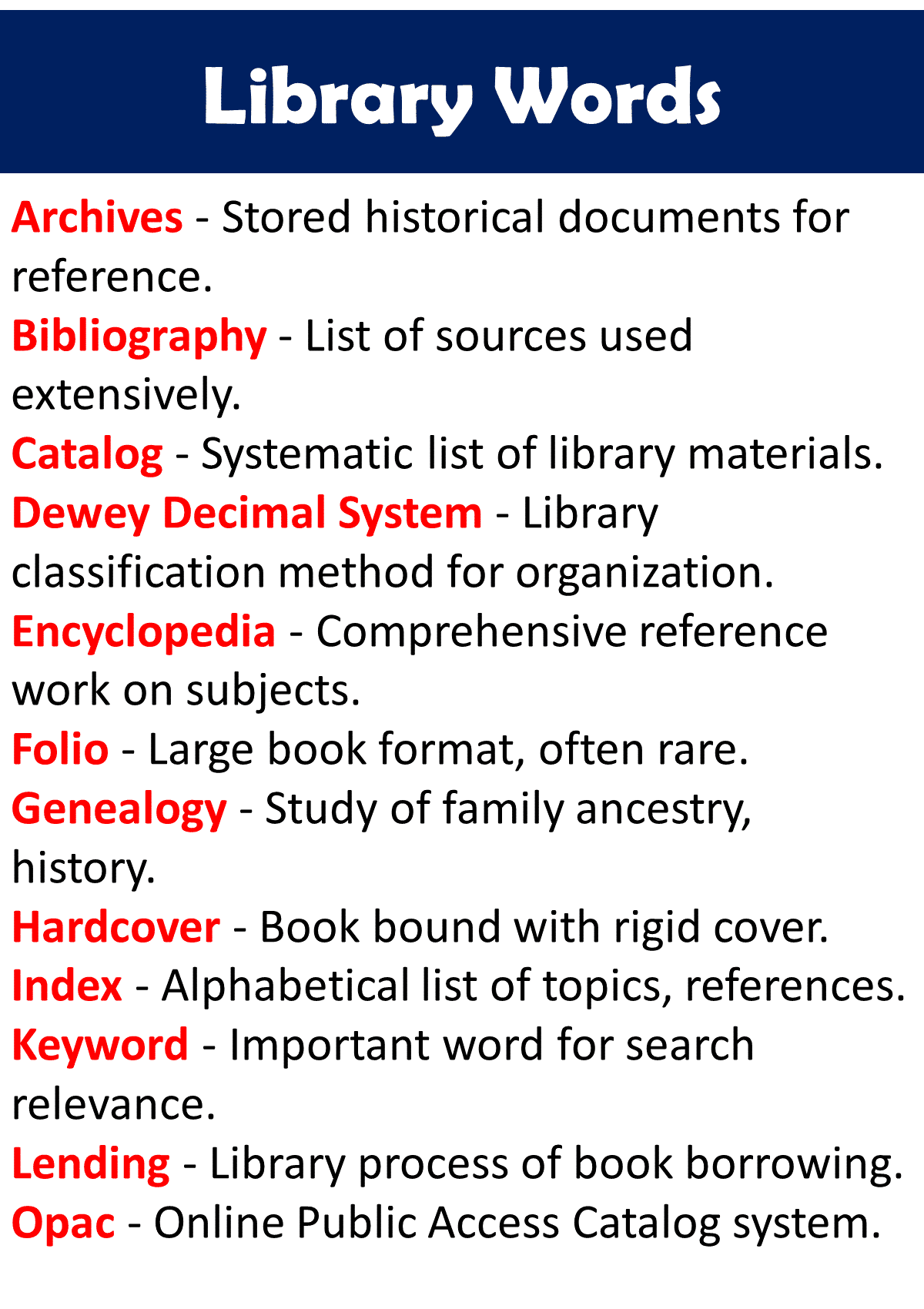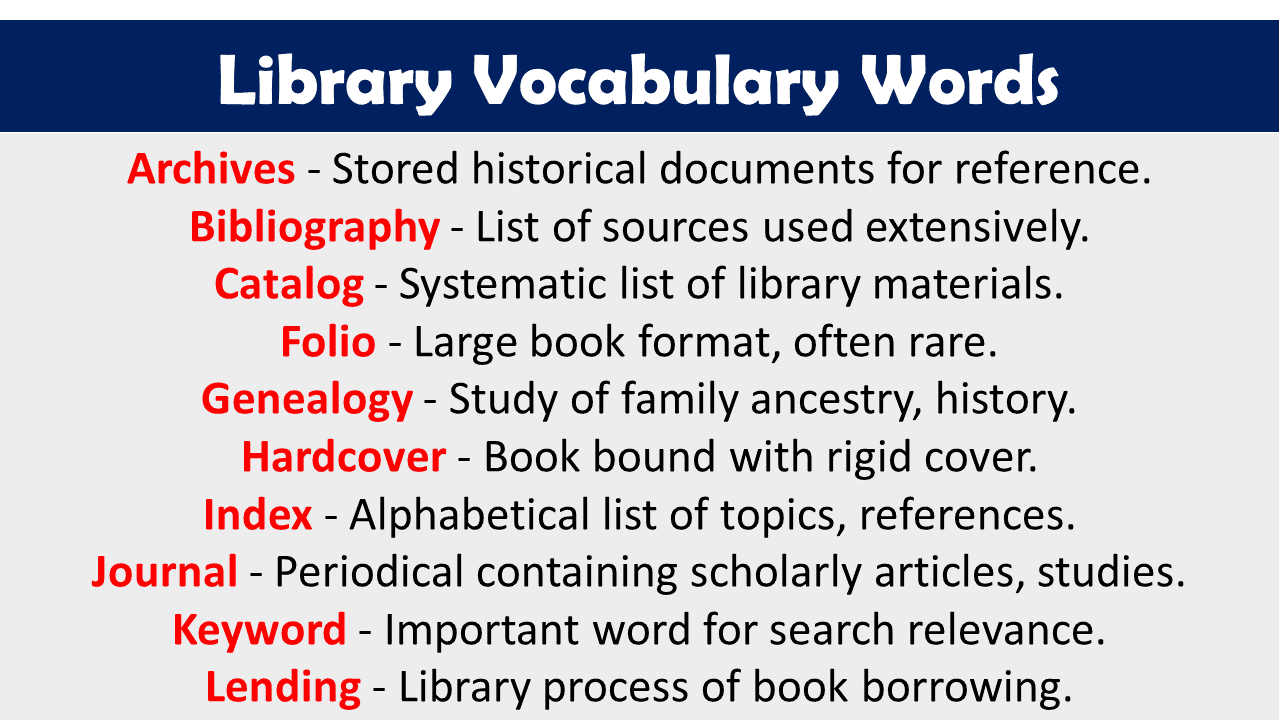Library vocabulary refers to the specific terms and phrases used in the context of libraries, crucial for anyone looking to make the most of these resources. For beginners, understanding this vocabulary is key to effectively navigating a library and utilizing its offerings. Familiarity with terms like “catalog,” “reference section,” and “periodicals” helps in locating materials and understanding the organization of the library. Additionally, knowing words like “bibliography,” “circulation desk,” and “interlibrary loan” can enhance your ability to access and manage information. Building a strong library vocabulary not only improves research skills but also maximizes the benefits of library resources, supporting academic and personal growth.
Library Words
- Archives – Stored historical documents for reference.
- Bibliography – List of sources used extensively.
- Catalog – Systematic list of library materials.
- Dewey Decimal System – Library classification method for organization.
- Encyclopedia – Comprehensive reference work on subjects.
- Folio – Large book format, often rare.
- Genealogy – Study of family ancestry, history.
- Hardcover – Book bound with rigid cover.
- Index – Alphabetical list of topics, references.
- Journal – Periodical containing scholarly articles, studies.
- Keyword – Important word for search relevance.
- Lending – Library process of book borrowing.
- Manuscript – Author’s handwritten or typed work.
- Non-fiction – Literature based on factual information.
- Opac – Online Public Access Catalog system.
- Periodical – Publication issued at regular intervals.
- Quarto – Book size, pages folded twice.
- Reference – Materials for in-library use only.
- Stacks – Bookshelves in a library setting.
- Thesaurus – Book of words and synonyms.
- Unbound – Pages not sewn into covers.
- Volume – Book part of a series.
- Withdrawn – Removed from library collection permanently.
- Xerography – Process for copying printed material.
- Yearbook – Annual compilation of notable events.
- Zeitschrift – German term for ‘journal’, periodic.
- Acquisition – Process of obtaining new materials.
- Barcode – Machine-readable representation for checkout.
- Circulation – Process of lending books, materials.
- Database – Online collection of searchable information.
- Ebook – Digital format of a book.
- Fines – Charges for overdue library items.
- Gazetteer – Geographical index or dictionary format.
- Hold – Request to reserve library materials.
- Interlibrary Loan – Borrowing books between different libraries.
- Juvenile – Section for children’s literature, books.
- Kit – Materials grouped for a purpose.
- Librarian – Professional overseeing library operations, services.
- Microfilm – Miniaturized photographs of documents, books.
- Novel – Fictional narrative book, longer form.
- Overdue – Returned past the due date.
- Patron – Registered library user, borrower.
- Query – Question to search library database.
- Renewal – Extending the borrowing period further.
- Serials – Publications in parts, continual series.
- Textbook – Book used for academic study.
- Usability – Ease of use within library.
- Vertical File – Collection of pamphlets, clippings, articles.
- Webinar – Online seminar, often library-hosted.
- Appendix – Supplementary material at book’s end.
- Bookmark – Device marking place in book.
- Classification – Categorizing books using a system.
- Document – Recorded information in any format.
- Ephemera – Temporary written and printed materials.
- Footnote – Note at page bottom, citations.
- Guide – Materials that offer structured information.
- Handbook – Compact reference book on subject.
- Illustration – Visual element enhancing text comprehension.
- Juvenilia – Works produced by young authors.
- Knowledge – Information available through library resources.
- Leaflet – Small printed piece, informational.
- Monograph – Scholarly book on single subject.
- Newsletter – Regularly distributed publication with news.
- Oversize – Books too large for normal shelves.
- Pamphlet – Unbound booklet, often informational.
- Quote – Direct excerpt from literary work.
- Reader – Person who reads, library user.
- Shelf – Horizontal surface holding library books.
- Tome – Large, scholarly book, often heavy.
- Underline – Emphasize text by marking below.
- Verso – Left-hand page of open book.
- Workbook – Manual with practice and exercises.
- Xenology – Study of phenomena relating to aliens.
- Yarn – Informal, often lengthy story.
- Zine – Noncommercial, often self-published magazine.
- Abstract – Summary of document’s content, purpose.
- Bindery – Facility where books are bound.
- Compilation – Collection of various items assembled.
- Dissertation – Extended written treatment of subject.
- Edition – Version of a published text.
- FAQ – List of frequently asked questions.
- Glossary – Alphabetical list of terms, definitions.
- Highlight – Mark text with transparent color.
- Inventory – Complete list of library items.
- Jacket – Protective and decorative book cover.
- Keystone – Central supporting element of system.
- Leaf – Single sheet within a book.
- Memoir – Personal record of historical events.
- Niche – Specialized market, focused subject area.
- Omnibus – Volume containing several novels.
- Proof – Test copy of printed work.
- Query – Search term used in databases.
- Recall – Request return of library material.
- Spine – Binding edge of a book.
- Tract – Brief treatise on religious subject.
- Upload – Send data from one device.
- Vellum – Fine parchment made originally from calf-skin.
- Workbook – Book containing exercises and problems.
- Xenography – Written script used among foreigners.
- Yarn – Long, often elaborate story narrative.
Explore More Words :

Library Vocabulary Words Elementary
- Books – Pages bound together for reading.
- Read – Look at and understand text.
- Shelves – Places where books are kept.
- Card – Used to check out books.
- Librarian – Person who helps find books.
- Story – A tale in a book.
- Title – Name of a book.
- Author – Person who writes books.
- Illustrator – Artist who draws book pictures.
- Chapter – Section of a book.
- Cover – Outer part of a book.
- Page – One side of a book’s leaf.
- Spine – Edge of book’s binding.
- Text – Written words in a book.
- Picture – Image or illustration in books.
- Bookmark – Marker to save reading place.
- Due – When a book must return.
- Renew – Extend the return time.
- Late – Returned past the due time.
- Fine – Fee for late book returns.
- Desk – Where the librarian works.
- Borrow – Take and return a book.
- Return – Bring back borrowed books.
- Fiction – Made-up or imaginary stories.
- Nonfiction – Books about real facts.
- Genre – Type or category of book.
- Mystery – Book about solving a crime.
- Fantasy – Book with magical elements.
- Adventure – Story with exciting experiences.
- History – Book about past events.
- Science – Book about scientific facts.
- Biography – Story about someone’s life.
- Magazine – Periodical with various articles.
- Newspaper – Daily or weekly publication.
- Audio – Books you can listen to.
- E-reader – Device for reading digital books.
- Database – Online collection of resources.
- Search – Look for books or information.
- Information – Facts or details in books.
- Learn – Gain knowledge from books.
- Study – Read carefully to learn.
- Quiet – No loud noise in library.
- Rule – Guidelines to follow in library.
- Seat – Place to sit and read.
- Table – Where you read or write.
- Section – Area for specific book types.
- Arrange – Put books in order.
- Organize – Keep books neatly sorted.
- Label – Tag that identifies book information.
- Find – Discover a book you need.
Library Rhyming Words
- Books – Looks
- Read – Seed
- Shelf – Elf
- Card – Hard
- Librarian – Vegetarian
- Story – Glory
- Title – Vital
- Author – Saucer
- Illustrator – Navigator
- Chapter – Captor
- Cover – Lover
- Page – Cage
- Spine – Fine
- Text – Next
- Picture – Fixture
- Bookmark – Remarked
- Due – Blue
- Renew – Review
- Late – Fate
- Fine – Dine
- Desk – Obelisk
- Borrow – Sparrow
- Return – Learn
- Fiction – Conviction
- Nonfiction – Prediction
- Genre – Senor
- Mystery – History
- Fantasy – Panacea
- Adventure – Denture
- History – Mystery
- Science – Compliance
- Biography – Typography
- Magazine – Marine
- Newspaper – Vapor
- Audio – Studio
- E-reader – Leader
- Database – Briefcase
- Search – March
- Information – Station
- Learn – Stern
- Study – Buddy
- Quiet – Diet
- Rule – Fuel
- Seat – Beat
- Table – Stable
- Section – Direction
- Arrange – Change
- Organize – Disguise
- Label – Fable
- Find – Mind
